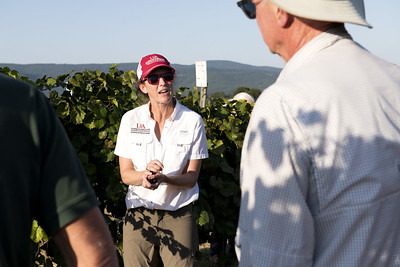Sept. 23, 2022
Seedless muscadines can put the folksy southerner one step closer to the dinner table
By John Lovett
U of A System Division of Agriculture
Fast facts
- Seedless Arkansas-grown muscadines in development at Fruit Research Station
- New seeded fresh-market and processing muscadines set for release in fall 2023
- Over 50 growers took part in the Muscadine Grape Workshop and Field Day
(574 words)
Related PHOTOS: https://flic.kr/s/aHBqjA7Rbn
FAYETTEVILLE, Ark. — Without big bitter seeds to expel, the flavorful muscadine could go from the front porch to the dinner table in America and beyond.
Fruit breeders with the Arkansas Agricultural Experiment Station, the research arm of the University of Arkansas System Division of Agriculture, are working on developing a seedless muscadine that can be grown in Arkansas as part of their mission to build up an Eastern table grape industry.
A muscadine with a texture that is more familiar to a wider audience – thinner skin and firmer flesh – is also part of the refinement process to propel the folksy muscadine to mass market appeal.
Muscadines were the center of attention on Monday, Sept. 19 at the experiment station’s Fruit Research Station near Clarksville. Over 50 muscadine growers and potential growers turned out for the annual Muscadine Grape Workshop and Field Day to hear updates on the Arkansas muscadine breeding program and recommendations from researchers and industry professionals.
Margaret Worthington, associate professor of fruit breeding and genetics, has been working to develop seedless Arkansas muscadine varieties in a Division of Agriculture partnership with North Carolina-based seedless muscadine breeder Jeff Bloodworth and Gardens Alive!, the Ohio-based gardening company. She has bred seedless varieties for Arkansas growing conditions since 2017 at the Fruit Research Station.
While many have tried to breed a seedless muscadine over the years, Worthington said Bloodworth was successful at crossing seedless Vitis vinifera grapes with muscadines to get a seedless grape with muscadine flavor and aroma characteristics.
Eleven seedless muscadine selections have advanced into growing trials at the Fruit Research Station, Worthington said.
“The conventional wisdom was that nobody wanted foxy or muscat flavors in a table grape,” Worthington said. “However, we can see products like Cotton Candy that are sold at a huge premium compared to neutral sweet grapes and are wildly profitable. I think it just turns that narrative on its head.”
Cotton Candy is a white table grape developed by International Fruit Genetics in partnership with the Division of Agriculture using pollen from a grape developed by John R. Clark, Distinguished Professor of horticulture, at the Fruit Research Station. Cotton Candy grapes are grown by Grapery in California. Based on information from Jack Pandol of Grapery, Worthington said consumers are not concerned about berry size, shape or color as much as flavor and texture.
“This tells me that muscadine flavor is its strength,” Worthington said. “What is a detriment might be the texture. To have a big product that sells to a wider audience than just those of us who grew up with muscadines and love them, you need that flavor in a texture that is a little bit more familiar to consumers.”
Two new muscadines on the way
Over the past 15 years the experiment station’s muscadine breeding program has planted over 20,000 seedlings leading to 342 selections. A group of advanced selections with improved consumer quality and cold hardiness are now moving forward in the breeding program, Worthington said.
Two new seeded Arkansas muscadine varieties are expected to be released to the public in the fall of 2023. One is a sweet “fresh-market” variety for eating, and the other is a “processing” grape intended for juices, wines, jellies and other products.
“Muscadine grapes are my favorite fruit, full stop,” Worthington said. “I think they are a delicious fruit and I’m excited and passionate about the product and developing it into something that is bigger than it is now.”
To learn more about Division of Agriculture research, visit the Arkansas Agricultural Experiment Station website: https://aaes.uada.edu. Follow on Twitter at @ArkAgResearch. To learn more about the Division of Agriculture, visit https://uada.edu/. Follow us on Twitter at @AgInArk. To learn about extension programs in Arkansas, contact your local Cooperative Extension Service agent or visit www.uaex.uada.edu.
About the Division of Agriculture
The University of Arkansas System Division of Agriculture’s mission is to strengthen agriculture, communities, and families by connecting trusted research to the adoption of best practices. Through the Agricultural Experiment Station and the Cooperative Extension Service, the Division of Agriculture conducts research and extension work within the nation’s historic land grant education system.
The Division of Agriculture is one of 20 entities within the University of Arkansas System. It has offices in all 75 counties in Arkansas and faculty on five system campuses.
Pursuant to 7 CFR § 15.3, the University of Arkansas System Division of Agriculture offers all its Extension and Research programs and services (including employment) without regard to race, color, sex, national origin, religion, age, disability, marital or veteran status, genetic information, sexual preference, pregnancy or any other legally protected status, and is an equal opportunity institution.
# # #
Media Contact: John Lovett
U of A System Division of Agriculture
Arkansas Agricultural Experiment Station
(479) 763-5929
jlovett@uada.edu

